IMPLEMENTATION OF INDONESIA'S MARINE POLICY A CASE STUDY: (Implementation of Presidential Regulation No. 16 of 2017 Concerning Indonesian Maritime Policy, Specifically Maritime Diplomacy in Papua)
Abstract
Good management of international relations has been a major concern of Indonesia's foreign policy since the country's independence. The character of the nation and state leaders is often the determining factor that causes relations between countries in a situation full of uncertainty. Some parties, based on the analysis of confidential documents, are allegedly trying to influence the policies of their respective countries to give recognition to Papuan independence and sovereignty. Based on Presidential Regulation No. 16 of 2017 concerning the Indonesian Maritime Policy dated February 20, 2017, Indonesia's geographical and demographic conditions will have consequences for the emergence of the real challenges for Indonesia that must be managed comprehensively. Specifically, in Papua, referring to data from the Navy of 2019, at least in the last period more than 50 (fifty) transnational crime and intrastate conflicts (communal conflicts and separatist movements) occurred in Papua. In addition to maritime defense forces, maritime diplomacy as a form of state policy has been transformed into an alternative in efforts to reduce the vulnerabilities that have arisen in the Papua region. The Navy as a military force is part of implementing the policy to realize the main program of Maritime Diplomacy, namely increasing the active role in efforts to create world peace and security. The Indonesian Navy describes the policy through the perspective of modern maritime defense policies that understand the nation's history to meet the political will aspects (maritime diplomacy) through cooperative, persuasive and coercive efforts. There are six factors that influence the implementation of the Maritime Diplomacy Policy in Papua, including: 1) Size and Policy Objectives; 2) Resources; 3) Characteristics of Implementing Agencies; 4) Communication between Implementing Agencies and Implementing Activities; 5) Disposition of Implementing Agencies; and 6) Environmental Effects. Environmental influences are the most influencing factors in implementing policies. The influence can come from inside or outside. The main internal influence comes from the longstanding conflict in Papua. External influences take the form of conventional and non-conventional threats.
Keywords: Maritime, Diplomacy, Papua












